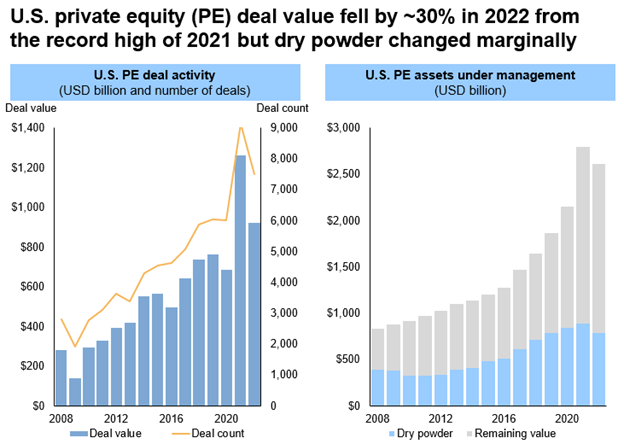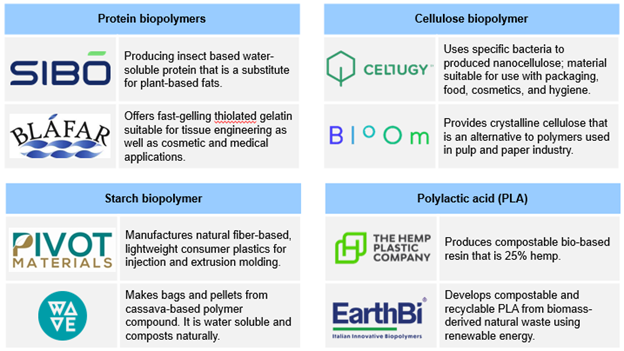U.S. private equity (PE) deals declined in value by 30% in 2022 from the record high of 2021 but dry powder changed marginally. Materials and resources were hard hit and deal value and transactions both fell by ~70% and ~40%, respectively. (Figure 1)

Figure 1: Private equity deals and assets
Plastics M&A also fell from its 15-year high in 2021 due to high interest rates and contracting debt markets, as did average valuations and deal count for chemical deals. Higher interest rates (especially in 2H22) led to greater caution around transactions and contracted debt markets impacted the ability of buyers to raise capital, cutting down the number of buyers and transactions. A smaller buyer pool has led a flight to quality, and deals with companies focusing on food & beverage and automotive & transportation (aside from electric vehicles) markets fell 50%. Finally, deals focusing on packaging, construction, industrial, recycling, and specialty markets grew.
Looking at the buyer universe, Asian chemical majors are acquiring companies in developed markets to access specialty chemicals expertise. Some of the major drivers of this include diversifying their presence into specialty chemicals, accessing expertise in innovation and specialty chemicals to benefit broader enterprise. Also, they want to build a hedge against a predominantly commodity chemical exposure and develop presence and networks in western markets as a way to source innovation for sustainability and decarbonization needs.
Finally, start-ups are proliferating as venture capital flow has not abated in several areas to develop new and innovative materials and processes. For example, Sibö, an early-stage company in protein biopolymers, is producing insect based water-soluble protein that is a substitute for plant-based fats, and Blafar offers fast-gelling thiolated gelatin suitable for tissue engineering, as well as having cosmetic and medical applications. Pivot Materials, a start-up in starch biopolymers, manufactures natural fiber-based, lightweight consumer plastics for injection and extrusion molding. The Hemp Plastic Company is producing compostable bio-based resin that is 25% hemp, and Bloom provides crystalline cellulose which is an alternative to polymers used in the pulp and paper industry. (Figure 2)

Figure 2: Early-stage companies in bioplastics
ADI Chemical Market Resources is a prestigious, boutique consulting firm specializing in chemicals, petrochemicals, polymers, and plastics since 1990. We bring deep, first-rate expertise in a broad range of markets and topics including industry M&A, private equity, and venture capital, where we support Fortune 500, mid-sized and early-stage companies, and investors with consulting services, research reports, and data and analytics, with the goal of helping our clients achieve the tangible results they are working toward.
Our former industry-leading conference, FlexPO+ is now a part of the ADI Forum, one of Houston’s distinguished industry conferences, bringing c-suite executives from across the value chains in oil & gas, energy transition, and chemicals together for meaningful, strategic dialogue.
Subscribe to our newsletter or contact us to learn more.

